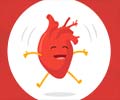- Atherosclerosis - (http://www.webmd.com/heart-disease/what-is-atherosclerosis?page=2)
About
The restricted blood flow due to atherosclerosis leads to a series of cardiovascular diseases (CVDs) such as heart attacks, peripheral vascular diseases and stroke.

Arteries are blood vessels that transport oxygen and necessary nutrients from the heart to other body parts. In a healthy person, the arteries are flexible and elastic.
Atherosclerosis should be differentiated from another similar term, which is arteriosclerosis. Arteriosclerosis is a condition in which an increase in pressure within the artery causes the artery walls to thicken and become stiff, resulting in restricted blood flow. Atherosclerosis is a type of arteriosclerosis, which begins with the deposition of cholesterol in the vessel wall. In this progressive condition, the plaques may not cause any symptoms until they reach a certain size and cause blockages.
Sometimes, the plaques may burst, resulting in a blood clot. A blood clot can break off at any one part of the body and can block the artery supplying blood to a totally different body part.
Studies have revealed that one in two adults above 50 years suffers from atherosclerosis. It is found to be present in a small percentage of teenagers too.
In the USA, cardiovascular diseases are a leading killer, and were responsible for more than 800,000 deaths in the year 2005 alone.
Causes
Causative factors for atherosclerosis include-
- Smoking
- Excessive alcohol
- Stress
- Lack of exercises
- High blood pressure
- High cholesterol
- High LDL levels
- Diabetes
The inner lining of arteries are made up of a fine layer of endothelial cells, which keeps them smooth and toned to enable smooth blood flow.
Atherosclerosis begins when any of the above causative factors or a combination of them damages the endothelial lining. The bad fats have a way of accumulating over the years, causing plaque formation along the lining of the artery and eventually blocking it.
Symptoms and Diagnosis
Atherosclerosis is usually symptom–free until it progresses to a severe form. Symptoms of moderate to severe atherosclerosis are the following-
- Angina or chest pain- if your heart arteries are affected.
- Sudden numbness/weakness in arms or legs, slurred speech, drooping facial muscles- if brain arteries are affected.
- Pain while walking- if arteries of the leg are affected.
- High blood pressure- if arteries to kidney are affected.
- Difficulty in having sex, erectile dysfunction in men- if genital arteries are affected.
Atherosclerosis can even lead to gangrene or aneurysm (bulge in the wall of artery) which can burst and cause internal bleeding.
Blood tests, ultra sound and ECG are part of the diagnostic procedures of atherosclerosis. Angiography is a popular diagnostic test where a special dye is injected to detect blood flow.
Treatment and Prevention
Once a block develops, it usually remains. The growth of the plaque can be slowed, or even stopped, with medications and changes in lifestyle such as healthy diet, abstaining from smoking and moderate exercising.
- Medication- Taking drugs for high cholesterol and high blood pressure will bring down the progress of atherosclerosis and decrease a person’s risk for CVD.
- Angiography and Stenting- Cardiac catheterization, with angiography of the coronary arteries, is the most common invasive procedure used to open a blocked artery. Stenting helps to prevent the artery from re-blocking.
- Bypass surgery- Bypass surgery is done by taking a healthy blood vessel from the leg or chest and using it to bypass a segment of the blood vessel that contains a block.
Atherosclerosis is a treatable and preventable condition. Those who are at high risk for atherosclerosis must start taking baby aspirins after consulting their doctor. Deaths due to atherosclerosis have fallen by 25% since 30 years ago thanks to better awareness among people, improved lifestyles and excellent treatments that are now available.















